PS4 vs Xbox One - Which is best in 2020?
Which console is best value, who has the best games and services; plus will PS4 Pro and Xbox Scorpio affect your choice?
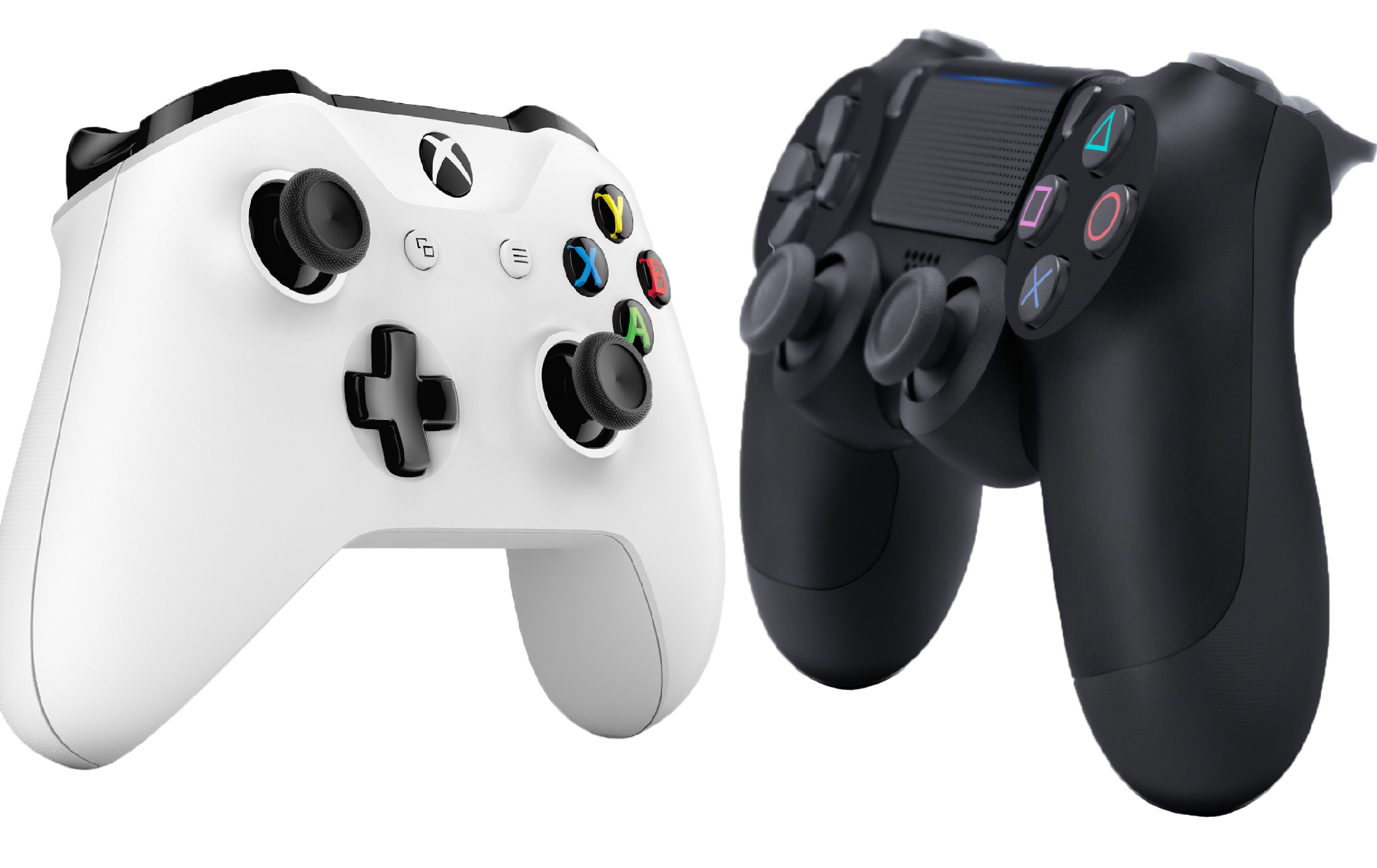
If Nintendo's Switch doesn't tickle your fancy, it's currently a two-way decision between PS4 vs Xbox One. Each console has particular strengths and weaknesses that go deeper than which games are exclusive to each system (though games are certainly a huge factor), and deciding how to spend your hard-earned money can be a daunting task.
To make your decision easier, we've broken down the most important aspects of competition between the two and declared a definitive winner. We'll take a look at the games, prices and bundles, the new PS4 Slim and Xbox One S models, the upcoming mid-generation upgrades, online services, controller quality, and more. You can't go wrong with either console, but if you really want to know which machine stands above the other, we have the full break down right here.
- Best PS4 games of 2020
- Best Xbox One games of 2020
- Best free PS4 games of 2020
- Best free Xbox One games of 2020
Games

Why are they important?
Games are, for most people, the reason you buy a console, and will make their choice based on which machine boasts the superior software lineup.
Xbox One has close to 900 games available to buy. The console's biggest hitters include Halo 5: Guardians, Forza Horizon 3, Rise of the Tomb Raider, Sunset Overdrive and Quantum Break. Microsoft is still aggressively pursuing timed-console exclusives (like Dead Rising 4), plus upcoming Xbox One games include Mass Effect: Andromeda and Final Fantasy XV. The Phil Spencer era continues to see the Redmond giant going big on first-party killer app contenders - we're finally getting a new Crackdown and Sea Of Thieves looks huge fun. Microsoft also deserves credit for its strides with backwards compatibility; a huge range of Xbox 360 titles can be played on the Xbox One; here's a list of the backwards compatible games.
PlayStation 4's catalog clocks in at well over 1100 games. While Sony hasn't released as many exclusives as some fans would like, a library that includes Uncharted 4, Bloodborne, Ratchet & Clank, DriveClub, Until Dawn, and No Man's Sky is still pretty damn strong. Looking ahead, The Last Guardian, God of War, and Horizon Zero Dawn should ensure PS4's first-party lineup gets even more alluring. Sadly, things aren't as bright with backwards compatibility - you can only play PS3 games on PS4 through Sony's (fairly expensive) PlayStation Now streaming service.
Winner: PlayStation 4. While Xbox One pulls ahead in terms of high-profile exclusives, PS4 has a superior variety of games - most of which run better on Sony's console - whether it's AAA blockbusters or offbeat indies.
Price
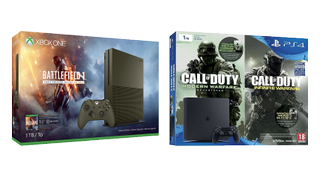
Why is it important?
Everyone loves a bargain, but the key battleground here is value – which console is most closely aligned with your needs?
With Xbox One S now the standard model, you can pick up a certified refurbished original Xbox One for around $200 (assuming you live in the US). That gets you the console, a single controller, and a 500GB hard drive. If you want the Xbox One S that'll cost you $300 for the 500GB version (usually bundled with a game), while the 2TB launch edition Xbox One S goes for $400. Neither of those models come with the (now largely defunct) Kinect camera. There are some insane deals doing the rounds too, as you'll find in our regularly updated Xbox One bundle deals article. Keep in mind you'll probably want to cough up an extra $60/ £40 annually for an Xbox Live Gold membership to play online. We cover this in more detail in a following section. For now, it's worth flagging that a recent Xbox One S promotion gives you three months of Xbox Live Gold for free.
PlayStation 4 Slim bundles are priced near identically to that of the Xbox One S. You can buy a 500GB console with Uncharted 4 for $300/ £259. Alternatively, you can get the original PS4 with Drake's final masterpiece for around $280 / £250, though expect prices on launch models to drop significantly in the following months as people start selling their old machines to buy a Slim/PS4 Pro. Speaking of the powerful mid-generation upgrade, the PS4 Pro costs $400 / £359; a competitive price when you consider it can deliver 4K gaming thanks to clever upscaling techniques. Again, you'll probably want to drop $60 / £39.99 annually for a PlayStation Plus membership to play online. We'll cover this more in the next section. To keep up to date with the latest bargains, check out our regularly updated best PS4 bundle deals article.
Sign up to the GamesRadar+ Newsletter
Weekly digests, tales from the communities you love, and more
Winner: Xbox One. Both consoles boast similarly priced bundles with their new slim models, but the Xbox One S offers better value when you you consider its 4K Blu-Ray player. Xbox One controllers are also a bit cheaper than the PS4's for the Player 2 in your life, and the Elite controller is probably the best you can get your hands on. That said, the PS4 Pro offers a serious power upgrade for $100 more.
Subscription Perks
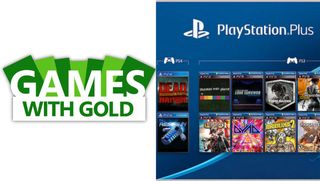
Why is it important?
You're offered a variety of (sometimes free) games and online offers by signing up for either a PlayStation Plus or Xbox Live Gold subscription.
Xbox One's subscription service, Xbox Live Gold, will set you back $60 annually and is required for playing games online. It's possible to buy one-month's access ($9.99) or three-month's access ($24.99) if you don't want to commit, but the value is worse. In the UK, expect to pay to pay £39.99 for a yearly Xbox Live Gold subscription. A Gold subscription also unlocks Games with Gold and Deals with Gold. Games with Gold is a rotating selection of free games for Xbox One and backwards compatible Xbox 360 games that changes each month and Deals with Gold is just what it sounds like: exclusive discounts on games. For more variety, there's also EA Access: a separate, $5-per-month subscription service that lets you play select EA classics and gives early access to new EA releases.
PlayStation 4 has a similar service in PlayStation Plus, which will run you $60 annually - until recently it was $50 - and is required to play games online. In the UK, the best-value package is £39.99 a year, although you can opt for lower value one-month-only deals. Having a PS Plus membership also unlocks a rotating collection of free games each month– typically at least one semi-recent AAA game, plus a critically acclaimed indie game – as well as discounts for members. But if you really want to go all out, you can also sign up for PlayStation Now, which lets you stream a collection of older PlayStation games (including hundreds of PS3 hits) to your PS4 starting at $20 per month.
Winner: PlayStation 4. Picking a winner here is tough, as both services are nearly identical. Both boxes can access Netflix, HBO Go, stream internet TV (for a fee), play Blu-rays, and more. In the end, the monthly PS Plus games are usually newer/more interesting than their Games with Gold counterparts, though online gaming through Xbox Live is usually a little more reliable.
Controllers
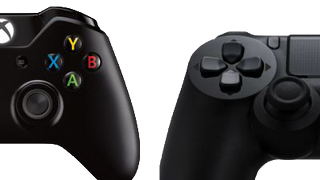
Why are they important?
Controllers are your primary interaction with the console, so precision and comfort is at a premium.
Xbox One's basic controller retails for about $50 and its design is both comfortable and ergonomic. It has an upgraded d-pad that's (thankfully) superior to the Xbox 360's, and the joysticks have great grip. Additionally, the integrated battery pack keeps the back from bulging out like the 360's did, and the rumbling triggers are fun (if not essential). However, the pad's L1 and R1 bumpers feel cheap and overly clicky. This keeps the Xbox One's controller from being the full upgrade it could have been, but if you're willing to spend a larger chunk of change you can pick up the Xbox One Elite controller. It makes vast improvements over the standard controller - it has a premium build set of interchangeable sticks and triggers - but it will set you back $150.
PlayStation 4's DualShock 4 is a massive improvement over its predecessor in almost every way, with a fantastic d-pad, satisfying buttons, much better sticks, and a headphone plug-in jack. That said, the clickable touchpad remains largely under utilised, while the option and share buttons are somewhat difficult to press. It's also a bit pricer than the Xbox One's controller, around $60. To accompany the PS4 Slim, Sony has also released a slightly updated DualShock 4, which now has a small LED strip on the touchpad that emits the same colour as the light bar. It's a minor, somewhat unnecessary change when you consider the rubber on the DualShock 4's sticks still have a nasty habit of wearing away.
Winner: PlayStation 4. This is easily the most subjective category, but the DualShock 4 is a colossal upgrade on its predecessor. Of course, the Xbox One pad is a mighty fine controller in its own right, but perhaps Microsoft played it a little too safe with the design. It's worth noting that the Xbox One Elite controller is on another level to either console's standard pad – but you pay for it.
Slim Versions: Xbox One S and PS4 Slim
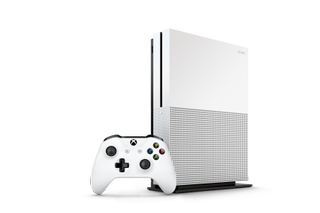
Why are they important?
Making a console purchase is now more complicated than ever. If you're new to the market, do you opt for a cheaper, older, version of a console – or the new, slightly pricier, slim model?
Xbox One S is 40% smaller than the launch model, more pleasing to the eye, and seeing as it draws less power than the default Xbox One, it should save you money on electricity bills. The sleek new console also supports High Dynamic Range, meaning supported games will look more vibrant... well, provided you have an expensive HDR TV - find out more by looking at our best gaming TVs. On the media-front, the Xbox One S supports 4K streaming services (like Netflix), while it's built-in 4K Blu-Ray drive really is a generous addition when you consider the price of standalone players.
PlayStation 4 Slim, which is now the default PS4 model, so don't expect to see the 'Slim' name highlighted, matches the Xbox One S blow-for-blow in some areas. It's 33% smaller than the original PS4, it's more power efficient, and it's also considerably quieter. However, unlike Xbox One S, which boats a 7% faster GPU than the launch Xbox One, PS4 doesn't see any significant boosts to its innards. It also lacks a UHD Blu-Ray player, not does it support 4K streaming, though the recent firmware 4.00 at least means it's HDR compatible.
Winner: Xbox One S. Microsoft's skinny redesign simply offers you more bang for your buck than the PS4 Slim. The boosted GPU offers a minor performance increase in some games, while its 4K Blu-Ray player makes it the best value 4K media device on the market.
VR and AR support

Why is it important?
Let's be frank, for many people, the drive to create new experiences in virtual reality and augmented reality aren't that important, but don't be fooled – this is unlikely to be a fleeting experiment, like 3D or Kinect, but here to stay.
Xbox One could be heading into augmented reality gaming with Microsoft's HoloLens device, which allows wearers to view holograms in the real world. So far, we've seen the HoloLens being used to display an AR hologram of Minecraft during the company's E3 2015 presentation and projecting virtual screens playing Halo 5 on real world walls. A developer model is now available, and costs *gulp* $3000 - hey, it is a self-contained, holographic PC. You can actually stream Xbox One games to this version of the headset, but it's unclear when a consumer HoloLens will be available - some industry insiders have speculated it could be years. Additionally, it's rumoured Project Scorpio will be compatible with Oculus Rift. It makes sense, seeing as Microsoft already has a relationship with Oculus VR: every Rift comes with a bundled Xbox One pad.
PlayStation 4, on the other hand, is diving head first into the VR craze and providing consumers with a 1080p headset that is in direct competition with its PC counterparts: the VIVE and Oculus Rift. The PlayStation VR headset is light, comfortable, and allows you to play VR titles without having to upgrade to a beefy gaming PC. At $399, it's the least expensive piece of equipment that can support titles like Resident Evil 7: Biohazard, EVE Valkyrie, Ace Combat 7, Rez, and a whole library of upcoming PSVR games when it's released October 13th. The PlayStation VR launch bundle comes with 18 demos (though Europe only gets 10) that span DriveClub, RIGS, Job Simulator and Resi 7's Kitchen demo. Said bundle also includes a PlayStation Camera (needed for head-tracking) and two PlayStation Move controllers.
Winner: PlayStation 4. With the continued silence around HoloLens, this is an easy win for PlayStation VR. Sony's headset is delivering affordable VR in the here and now, while all Microsoft's hazy AR strategy does is pose augmented questions. On a much longer horizon, however, it's possible that AR will prove the more mass-market experience.
Broadcasting, Sharing and Streaming
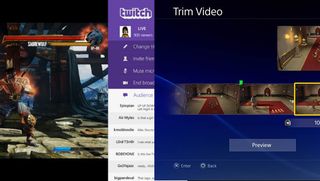
Why is it important?
Budding streamers and YouTubers will appreciate the nuances of each console's broadcasting abilities and sharing services, more casual gamers will just appreciate the ability to capture cool moments and share them with friends on social media.
Xbox One's versatile Upload app is great for capturing clips quickly, editing them, and sharing them online. You can also now take screenshots during games and share them in a similar fashion, though it's a little clunky and nowhere near as idiot-proof as PS4's share system. For streaming, Xbox One's Twitch app is very robust, letting you archive, utilize multiple audio sources, and do picture-in-picturing if you have a Kinect. Microsoft have just announced a new Xbox One Beam streaming option which will be 10x faster than Twitch, but that won't debut until early 2017.
PlayStation 4's share functionality is fool-proof. A simple push of the 'Share' button gives you the option to capture a screen, video, or both. The ShareFactory editor has everything you need to prep a quick YouTube video, or you can go live using either Twitch or Ustream. Finally, SharePlay lets you recreate the couch co-op experience with another player online. As for PS4 Pro, Sony has beefed-up the resolution and fps performance of certain streaming features. The new console offers 1080p streaming for SharePlay and for Remote Play on PC/Mac, and 1080p broadcasting for both YouTube and Twitch - the former at 60fps, the latter at 30fps. In contrast, all streaming on the normal PS4 is limited to 720p.
Winner: PlayStation 4. Is it any surprise that the console with a 'Share' button won this category? Both boxes are equipped to stream, but the ease-of-use with PS4 pushes it over the edge. This may be a category worth re-visiting when Xbox One's new Beam streaming technology is implemented in 2017.
Upgraded consoles: PS4 Pro and Xbox Scorpio
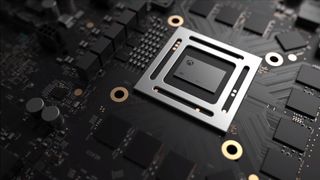
Why are they important?
Do you wait for the upgraded version of either console to launch before making a choice – and if you commit today, which upgraded console is most likely to leave your current console obsolete? The traditional lines between console generations are being blurred, with Microsoft talking about 'leaving no one behind'. Either way: which upgrade will be most powerful?
Project Scorpio and PlayStation 4 Pro represent a change of guard for the traditional console cycle. Rather than upgrading to a new machine every five-six years, gamers are being given the choice of buying more powerful versions of hardware that launched only two-three years ago. It's part of a changing console market that's trying to tap into the iterative upgrade model seen in the phone space.
Project Scorpio likely won't launch until late 2017, but Microsoft is already teasing us with some serious specs. The main takeaway is this: it's a beefed-up Xbox One that will play all your existing games, but one that's also been designed from the ground up to support native 4K gaming. Compared to the original Xbox One, which struggles to run many games at 1080p, Scorpio is a monster. There's talk of 12GB of DDR5 RAM, a hugely boosted GPU, and a significantly upgraded eight-core CPU. If those techy terms mean nothing to you, just know Scorpio should be able to run games at true 4K - that's over four times the resolution most current Xbox One games run at.
PlayStation 4 Pro can't quite match Scorpio's specs, but it still represents a significant upgrade over the default PS4. The Pro's Radeon GPU is over twice as powerful than the one in the launch console, it has an extra 512MB of overclocked RAM, and its CPU is 30% faster. Like Scorpio it offers 4K streaming media playback, though it lacks the UHD Blu-Ray drive of Microsoft's system. There are also questions over its 4K gaming credentials. Some existing games are getting native 4K patches - like The Last Of Us: Remastered - while other titles use what Sony describes as 'checkerboard rendering' to upscale games to 4K, leading to a slightly softer image than native 4K. Regardless of the techniques used, games that have Pro mode patches will look a lot sharper than titles played at 1080p. The most significant detail is that PS4 Pro launches on November 10th, 2016, so it's a choice to consider today, while Xbox Scorpio is likely over 12 months away.
Winner: Tie. It's too early to say which console will end up benefiting gamers most. When PS4 Pro launches on November 10th, it will likely enjoy a year's head start on Scorpio. Then again, the upgraded Xbox looks a good deal more powerful, and should be able to handle native 4K gaming more easily. Yet the same major question plagues both systems: if you don't own a 4K TV, does either machine offer enough of a boost to 1080p gaming to make them worth upgrading to? Time will tell.
Closing arguments: Xbox One
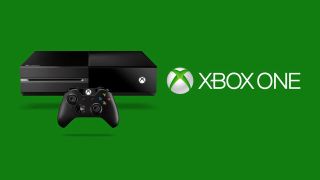
The Xbox Live service is superb, providing subscribers with monthly free games, reliable connectivity and updates, and, with the new user interface, an easily accessible online Store.
The updated interface vastly improves the speed of navigating the Xbox One Dashboard. Creating Xbox Live Parties with friends has been streamlined, making the process much faster from a processing and user input standpoint. The increase in speed also goes for Snapping achievements in game, sending messages, and engaging with various game communities.
Under Xbox boss Phil Spencer, the One is rapidly acquiring a killer lineup of first-party hits. The company is also changing how we view the Xbox platform with Xbox Play Anywhere. It's an initiative that lets you play Microsoft-published games - such as Gears Of War 4 and Forza Horizon 3 - on Xbox One and a Windows 10-powered PC with full cross-save compatibility providing you buy the digital version of the game. It merges the console and PC spaces together more closely than ever.
You can use up to two external hard drives for extra storage, but they have to be 256GB or larger and support USB 3.0. Once formatted, they can hold games, apps, DLC, or whatever else is filling up your Xbox One.
Cable TV boxes can also be hooked straight into your Xbox One, so you don't have to switch inputs when you want to watch TV, and can even use Kinect to change channels, though these features don't feel as big of a deal as Microsoft made them out to be at launch.
Finally, the console has a fine controller, while the new Xbox One S provides a sleek redesign that also acts as the best value 4K media device on the market.
Closing arguments: PlayStation 4
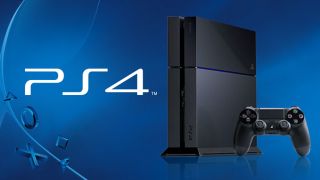
The PS4 can hook up with all kinds of devices. Android and iOS tablets can run the PlayStation app for basic interaction with the console, while select Sony smartphones can even remote play games. And using the PS Vita to remote play Destiny in bed is a dream.
You can view global completion rates for individual trophies on PS4. Its a nice bragging right to perform an "Ultra Rare" feat that only 0.10% of players have accomplished.
Spotify is fully integrated on PS4, letting you enjoy your favorite playlists while you play. You can even use your smartphone or tablet to fiddle with the music without interrupting your game.
More than anything though, the PS4 is the 'anti-PS3' in all the ways that count. Thanks to a newfound humbleness Sony has made a brilliantly versatile machine. The pad's great, it's easy to develop for, its indie scene is vibrant, and sharing awesome experiences with friends is a doddle. Sony done good.
The Winner: PlayStation 4 (for now)

The PlayStation 4 is absolutely nailing that ideal triumvirate of great games, robust online features, and slick hardware design. For most of this generation it's had all the goodwill and momentum, and that doesn't seem to be slowing down. But the Xbox One is not far behind, especially with the introduction of the sleeker Scorpio model. There's a lot to love in both boxes, and this console war isn't going to be wrapping up any time soon.
But at the end of the day, one factor should rise above all else: the games. If there's a particular game that you really want to play that's only available on one console or another, let that be your guiding light when making a purchase. You won't be disappointed with either console, so get out there and play the games you love.
GamesRadar+ was first founded in 1999, and since then has been dedicated to delivering video game-related news, reviews, previews, features, and more. Since late 2014, the website has been the online home of Total Film, SFX, Edge, and PLAY magazines, with comics site Newsarama joining the fold in 2020. Our aim as the global GamesRadar Staff team is to take you closer to the games, movies, TV shows, and comics that you love. We want to upgrade your downtime, and help you make the most of your time, money, and skills. We always aim to entertain, inform, and inspire through our mix of content - which includes news, reviews, features, tips, buying guides, and videos.
Most Popular



